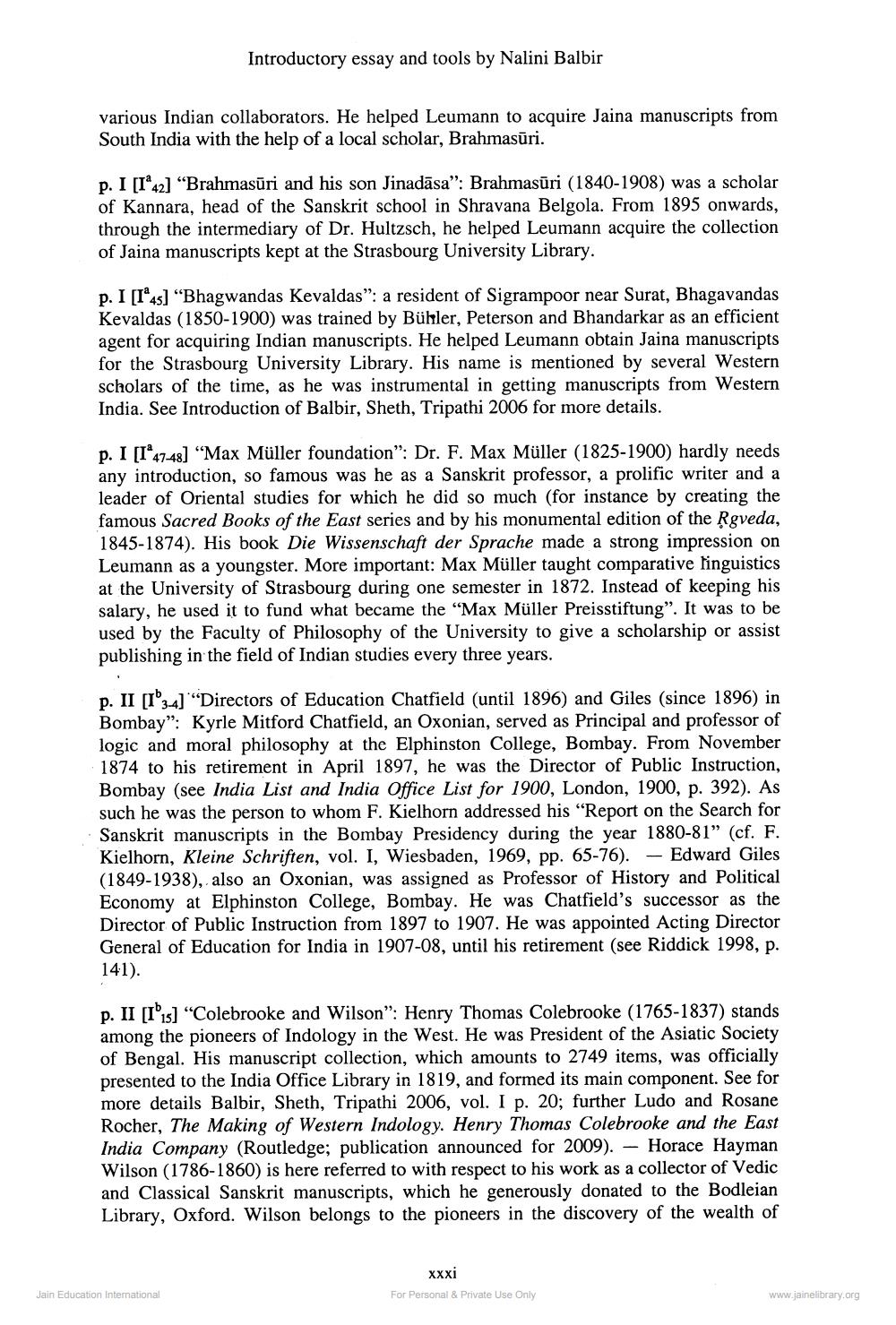________________
Introductory essay and tools by Nalini Balbir
various Indian collaborators. He helped Leumann to acquire Jaina manuscripts from South India with the help of a local scholar, Brahmasūri.
p. I [1442] “Brahmasūri and his son Jinadāsa": Brahmasūri (1840-1908) was a scholar of Kannara, head of the Sanskrit school in Shravana Belgola. From 1895 onwards, through the intermediary of Dr. Hultzsch, he helped Leumann acquire the collection of Jaina manuscripts kept at the Strasbourg University Library.
p. I [1945] "Bhagwandas Kevaldas”: a resident of Sigrampoor near Surat, Bhagavandas Kevaldas (1850-1900) was trained by Bühler, Peterson and Bhandarkar as an efficient agent for acquiring Indian manuscripts. He helped Leumann obtain Jaina manuscripts for the Strasbourg University Library. His name is mentioned by several Western scholars of the time, as he was instrumental in getting manuscripts from Western India. See Introduction of Balbir, Sheth, Tripathi 2006 for more details.
p. I [1°47-48] "Max Müller foundation": Dr. F. Max Müller (1825-1900) hardly needs any introduction, so famous was he as a Sanskrit professor, a prolific writer and a leader of Oriental studies for which he did so much (for instance by creating the famous Sacred Books of the East series and by his monumental edition of the Rgveda, 1845-1874). His book Die Wissenschaft der Sprache made a strong impression on Leumann as a youngster. More important: Max Müller taught comparative linguistics at the University of Strasbourg during one semester in 1872. Instead of keeping his salary, he used it to fund what became the "Max Müller Preisstiftung". It was to be used by the Faculty of Philosophy of the University to give a scholarship or assist publishing in the field of Indian studies every three years.
p. II [1°34) ""Directors of Education Chatfield (until 1896) and Giles (since 1896) in Bombay”: Kyrle Mitford Chatfield, an Oxonian, served as Principal and professor of logic and moral philosophy at the Elphinston College, Bombay. From November 1874 to his retirement in April 1897, he was the Director of Public Instruction, Bombay (see India List and India Office List for 1900, London, 1900, p. 392). As such he was the person to whom F. Kielhorn addressed his "Report on the Search for Sanskrit manuscripts in the Bombay Presidency during the year 1880-81" (cf. F. Kielhorn, Kleine Schriften, vol. I, Wiesbaden, 1969, pp. 65-76). – Edward Giles (1849-1938), also an Oxonian, was assigned as Professor of History and Political Economy at Elphinston College, Bombay. He was Chatfield's successor as the Director of Public Instruction from 1897 to 1907. He was appointed Acting Director General of Education for India in 1907-08, until his retirement (see Riddick 1998, p. 141).
p. II [1'15] "Colebrooke and Wilson": Henry Thomas Colebrooke (1765-1837) stands among the pioneers of Indology in the West. He was President of the Asiatic Society of Bengal. His manuscript collection, which amounts to 2749 items, was officially presented to the India Office Library in 1819, and formed its main component. See for more details Balbir, Sheth, Tripathi 2006, vol. I p. 20; further Ludo and Rosane Rocher, The Making of Western Indology. Henry Thomas Colebrooke and the East India Company (Routledge; publication announced for 2009). – Horace Hayman Wilson (1786-1860) is here referred to with respect to his work as a collector of Vedic and Classical Sanskrit manuscripts, which he generously donated to the Bodleian Library, Oxford. Wilson belongs to the pioneers in the discovery of the wealth of
xxxi For Personal & Private Use Only
Jain Education International
www.jainelibrary.org




